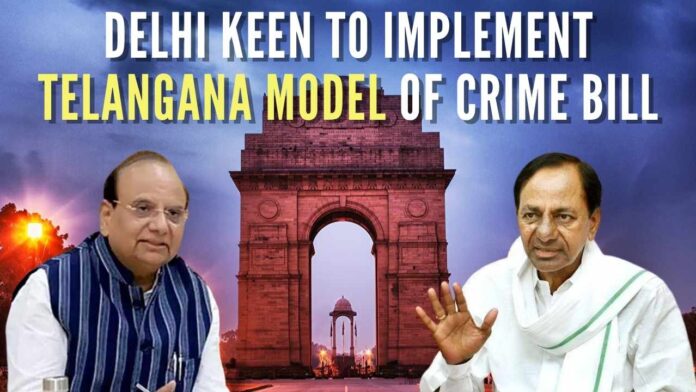
Lt. Gen Saxena has approved it
The Bhartiya Janata Party (BJP) appointed New Delhi Lieutenant Governor Vinai Kumar Saxena has approved and forwarded a Delhi Police proposal to the Centre, seeking to extend an anti-crime bill pushed through by K Chandrasekhar Rao of BRS. The law provides for the preventive detention of criminals and members of organized syndicates, whose activities affect or are likely to impact the maintenance of public order. Insiders say that on Amit Shah Union Home Minister’s instructions such an order is being passed.
Police sought the extension of the law, the Telangana Prevention of Dangerous Activities Act, to counter organized crime, sexual offences, land grabbing, chain snatching, etc.
In 2021, the Supreme Court, while hearing a case on how people granted bail were immediately being detained under the law, termed it “draconian” and expressed surprise that no one had challenged it. BJP might be after Kavitha in the Delhi liquor scam. But it is keen to adopt the Telangana model. In 2021, the Supreme Court, while hearing a case on how people granted bail were immediately being detained under the law, termed it “draconian” and expressed surprise that no one had challenged it.
If the Union Home Ministry extends the law, it will empower police to preventively detain bootleggers, drug and prostitution law offenders, land grabbers, food adulterers, fake document makers, sexual offenders, and cybercriminals.
The law also covers white-collar crime
The Centre exercises executive powers related to land, the police, and public order with respect to the National Capital Territory of Delhi. The Union Home Ministry will take a final decision on extending the Telangana law. According to the Union Territories (Laws) Act, 1950, the Centre may by notification in the official gazette extend to Delhi any law in force in other states with any restrictions and modifications as it deems fit.
The Delhi Police in June sought approval for extending the law citing “a need for stringent legislation for the prevention and effective control” of criminal activities. It said there was a need to particularly check repeat offenders involved in bootlegging, land grabbing, snatching, robbery, arms running, sale of drugs, gambling, and sexual offences. The police argued that the existing laws on preventive detention and public safety were not adequate.
Delhi police spokesperson Suman Nalwa said, “This is a stringent law to maintain law and order and deal with people involved in criminal activities and even organized crimes. It will strengthen the hands of police personnel, investigators in particular. This law will help us bring down cases of crimes against women and also act against notorious gangsters and criminals.”
The LG and a spokesperson for the Aam Aadmi Party (AAP), which runs Delhi’s elected government, declined to comment.
How the Law prevents misuse
One of the officials quoted above said the Telangana law seeks to prevent misuse by providing for an advisory board to ratify detentions and their extension under the legislation. All detentions are subject to ratification and need to come up before the board within three weeks. In the event the board does not ratify detention, the person can be released. The period for such detention in the first instance cannot exceed three months. The maximum period of detention shall not be over 12 months, according to the law.
The law also provides immunity to the police. “No suit, prosecution or other legal proceedings shall lie against the government or any officer or person, for anything in good faith done or intended to be done in pursuance of this Act,” it says.
The law also says that grounds for an order of detention to be disclosed to persons affected by the order. “When a person is detained in pursuance of a detention order, the authority making the order shall as soon as may be but not later than five days from the date of detention, communicate to him the grounds on which the order has been made and shall afford him the earliest opportunity of making a representation against the order to the government.”
Advocate Sidharth Luthra said: “Delhi already has extended the Maharashtra Control of Organized Crime Act (MCOCA) to deal with organized crime. In my view, there are adequate preventive detention laws such as the National Security Act (NSA) or the Prevention of Illicit Traffic in Narcotics Drugs and Psychotropic Substances (PITNDPS) Act, which apply in Delhi. The multiplicity of laws does not always make for effective application of laws.”
A senior Delhi Police official, said, “For effective implementation of law and order in Delhi, stringent laws are required. For example, the amended law against snatchers which was implemented in Haryana has shown it acts as a deterrent. Though police do have the option of using the National Security Act in Delhi, it is always better if there are others laws to deal with daily street crimes. At the same time, the top brass should ensure that the law is implemented in the right spirit.”
PGurus is now on Telegram. Click here to join our channel and stay updated with all the latest news and views
For all the latest updates, download PGurus App.
- Supreme Court rejects plea to tally all VVPAT slips with EVM votes; says ‘no going back to paper ballot’ - April 26, 2024
- US report citing human rights violations is deeply biased: India - April 25, 2024
- Kotak Mahindra Bank shares tank 13%. Market Cap erodes by Rs.37,721 cr post-RBI action - April 25, 2024











Good ideas can be copied irrespective of who is the originator. Give credit to the originator also to make bad karma does not come back & haunt